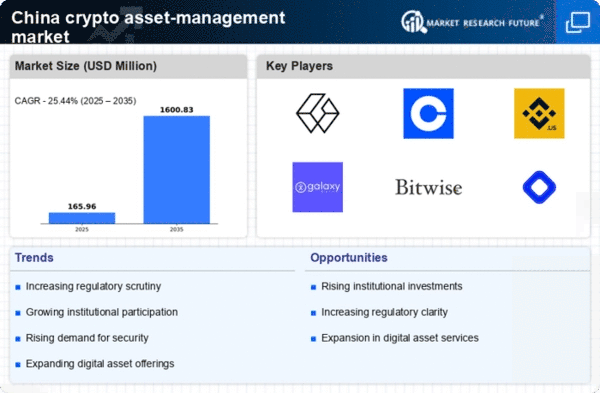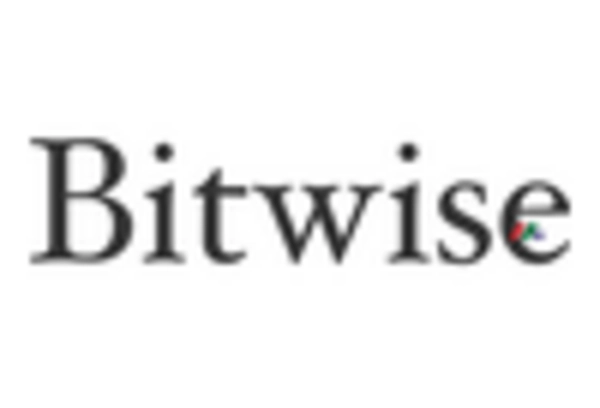Emerging Investment Products
The introduction of innovative investment products is poised to reshape the crypto asset-management market in China. As of November 2025, the market has witnessed a rise in exchange-traded funds (ETFs) and other structured products that provide exposure to cryptocurrencies. These products are designed to appeal to both institutional and retail investors, offering a regulated and simplified way to invest in digital assets. The availability of such products may enhance the legitimacy of the crypto market, attracting more conservative investors who were previously hesitant. Consequently, this trend could lead to an increase in assets under management, further solidifying the position of asset managers in the evolving landscape.
Growing Institutional Interest
Institutional interest in cryptocurrencies is becoming increasingly pronounced, serving as a crucial driver for the crypto asset-management market in China. Major financial institutions are beginning to allocate a portion of their portfolios to digital assets, with estimates indicating that institutional investments could account for up to 20% of the total market by the end of 2025. This shift is likely to bring a level of professionalism and stability to the market, as institutional players often demand higher standards of compliance and risk management. The influx of institutional capital may also lead to the development of more sophisticated asset management strategies, further enhancing the market's appeal to a wider range of investors.
Increased Retail Participation
The growing interest among retail investors in cryptocurrencies is likely to significantly impact the crypto asset-management market in China. As of November 2025, retail participation in the crypto market has surged, with estimates suggesting that over 30 million individuals are actively trading digital assets. This influx of retail investors may drive demand for more accessible and user-friendly asset management solutions. Financial institutions are responding by developing tailored products that cater to this demographic, such as crypto savings accounts and automated trading platforms. The increased retail engagement could lead to a more vibrant market, fostering competition among asset managers and potentially lowering fees for consumers.
Regulatory Developments and Compliance
The evolving regulatory landscape in China is a significant driver for the crypto asset-management market. As authorities continue to clarify regulations surrounding cryptocurrencies, asset managers are likely to adapt their strategies to ensure compliance. By November 2025, the Chinese government has implemented a series of regulations aimed at fostering innovation while safeguarding investors. This regulatory clarity may encourage more firms to enter the market, as compliance reduces the perceived risks associated with crypto investments. Furthermore, a well-defined regulatory framework could enhance investor confidence, potentially leading to increased capital inflows into the market and a broader acceptance of crypto asset management as a legitimate investment avenue.
Technological Advancements in Blockchain
The rapid evolution of blockchain technology appears to be a pivotal driver for the crypto asset-management market in China. Innovations such as improved scalability, enhanced security protocols, and interoperability among different blockchain networks are likely to facilitate more efficient asset management solutions. As of November 2025, the market capitalization of blockchain technology in China has reached approximately $200 billion, indicating a robust interest in its applications. This technological progress may enable asset managers to offer more sophisticated products, thereby attracting a broader range of investors. Furthermore, the integration of artificial intelligence and machine learning into blockchain systems could enhance decision-making processes, making asset management more data-driven and responsive to market changes.
















